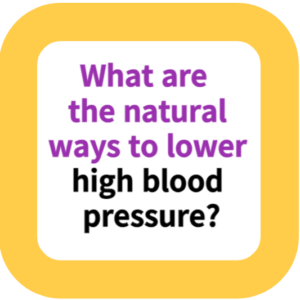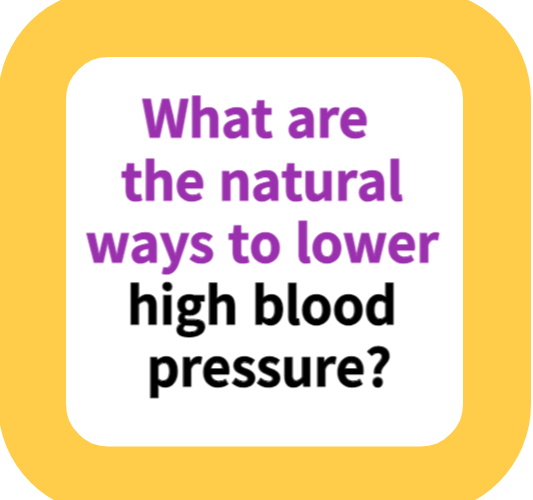What are the natural ways to lower high blood pressure?
Welcome to our latest blog post where we delve into the critical issue of high blood pressure, a condition affecting millions worldwide. In this comprehensive guide, we explore a variety of natural strategies to manage hypertension, moving beyond the conventional reliance on medication.
Our article provides in-depth insights into lifestyle modifications, dietary adjustments, and natural remedies that can effectively lower blood pressure. From the benefits of regular physical activity and heart-healthy dietary choices to the potential of natural supplements and the importance of mental well-being, we cover a range of topics to help you understand and combat high blood pressure.
Whether you’re looking to enhance your current treatment plan or seeking alternative methods for blood pressure management, this post offers valuable information and practical tips for a healthier, more balanced life. Join us as we navigate the journey towards better heart health and overall well-being.
What are the natural ways to lower high blood pressure?

Introduction: The Challenge of High Blood Pressure
High blood pressure, also known as hypertension, is a prevalent health concern affecting millions globally. Characterized by the increased force of blood against artery walls, it poses risks of heart disease, stroke, and kidney failure.
Although medications are commonly prescribed, a growing interest in natural methods for managing this condition has emerged. This article delves into various lifestyle modifications and natural remedies that can effectively lower blood pressure.
Lifestyle Changes to Combat High Blood Pressure
Weight Management: Excess weight is a significant risk factor for hypertension. Adopting a nutritious diet and regular physical activity can aid in weight loss and consequently lower blood pressure.
Regular Physical Activity: Engaging in at least 30 minutes of moderate-intensity exercise most days is vital. This not only strengthens the heart but also improves blood flow and reduces blood pressure.
Dietary Choices for Heart Health: A balanced diet, rich in fruits, vegetables, whole grains, lean proteins, and low-fat dairy, can significantly influence blood pressure. Limiting intake of harmful fats, sodium, and added sugars is equally important.
Moderation in Alcohol Intake and Smoking Cessation: Reducing alcohol consumption and quitting smoking are crucial. While moderate alcohol intake may not significantly affect blood pressure, smoking has a direct negative impact on arterial health.
Natural Remedies for Blood Pressure Reduction
The Role of Garlic: Garlic is known for its ability to relax blood vessels, thus aiding in blood pressure reduction.
Hibiscus Tea Benefits: Acting as a natural diuretic, it lowers blood pressure and provides antioxidants that support heart health.
Magnesium’s Importance: Found in foods like spinach and almonds, magnesium helps in vascular relaxation, thereby reducing blood pressure.
Coenzyme Q10 and Omega-3s: These substances improve heart function and reduce inflammation, contributing to lower blood pressure.
Dietary Strategies for Blood Pressure Management
Reducing Sodium and Simple Carbohydrates: High sodium intake is linked to increased blood pressure, while simple carbs contribute to water retention, similarly impacting blood pressure.
Eating in Moderation: Reducing overall food intake, particularly processed foods, and incorporating more vegetables can make a significant difference. Eggs might also play a role in blood pressure management according to some studies.
Alcohol and Blood Pressure
Individuals react differently to alcohol; light to moderate consumption may not affect blood pressure for some, while heavy drinking is generally harmful.
Exercise for Hypertension Control
A combination of resistance training and cardiovascular exercise is recommended. Regular, vigorous exercise is more effective in managing blood pressure than less intense activities.
Lifestyle Adjustments for Better Health
Improving sleep quality, extending exhales during breathing, meditation, and maintaining a positive mindset are key lifestyle factors that can influence blood pressure.
Supplements and Alternative Therapies
While certain supplements like Hawthorn root and Chinese herbs may be effective, others like Valerian and Fish Oil have mixed results. Alternative therapies such as acupuncture and massage could also be explored.
Conclusion: A Comprehensive Approach to Managing Hypertension
Effectively managing high blood pressure requires a holistic approach. Beyond medication, incorporating natural strategies like dietary changes, regular exercise, stress management, and potentially beneficial supplements can play a significant role in controlling hypertension.
Adopting these lifestyle modifications can lead to substantial improvements in blood pressure levels and overall well-being, underscoring the importance of a comprehensive approach to health.
